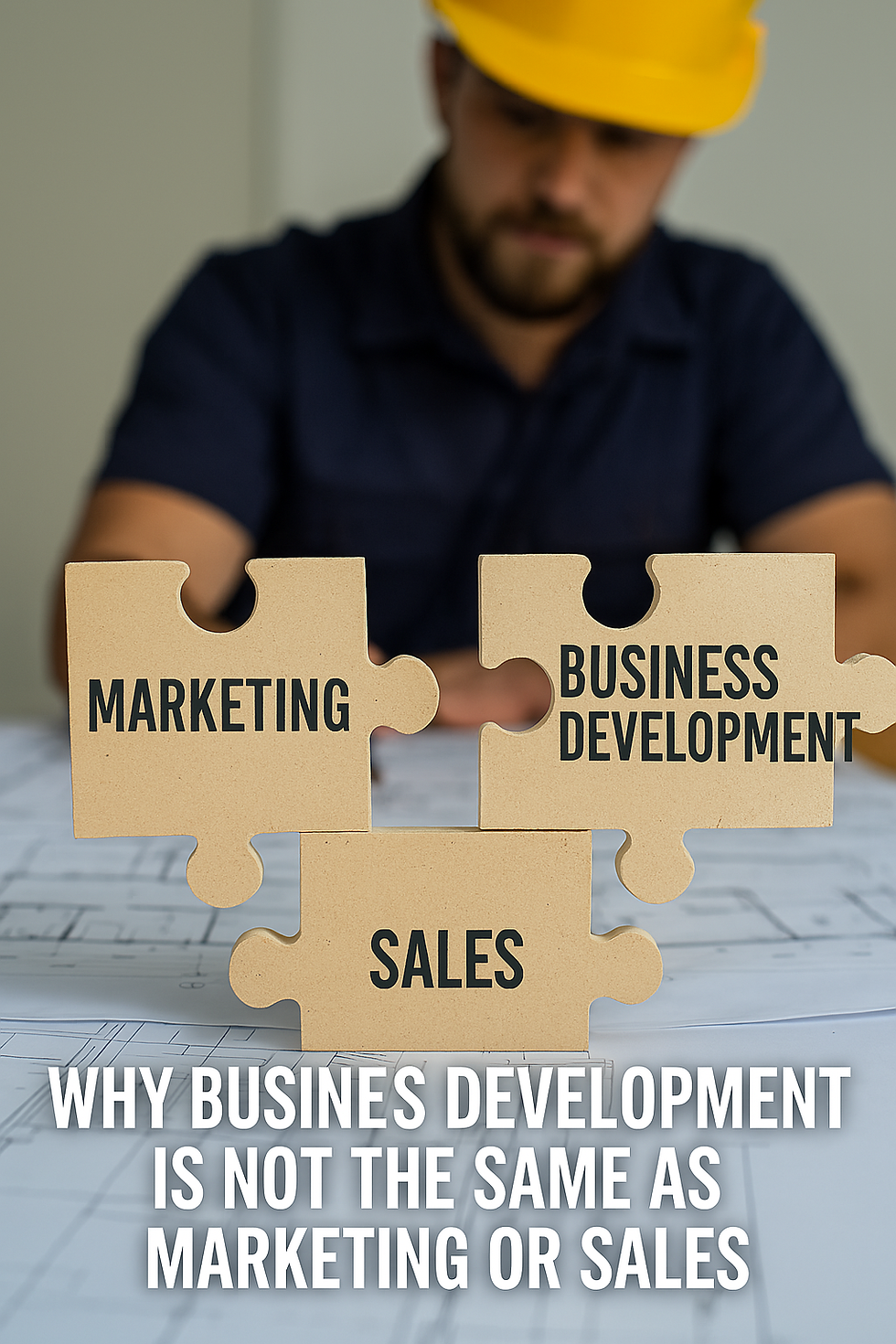Why Business Development is Not the Same as Marketing or Sales—Especially in Roofing
- John Kenney
- Aug 4, 2025
- 3 min read

The roofing industry often blurs the lines between business development, sales, and marketing. Many contractors assume that "doing more marketing" or "closing more jobs" equates to business development. In reality, business development is a distinct and critical function that helps your roofing company grow strategically and sustainably over time, not just close deals or generate leads.
As competition increases and customer expectations shift, understanding and leveraging the true role of business development can be the difference between a contractor surviving and one dominating the market.
Defining Business Development in Roofing
Business development involves identifying and building long-term value through strategic partnerships, market positioning, and sustainable growth opportunities. Unlike marketing, which attracts potential customers, and sales, which converts leads into contracts, business development:
Focuses on partnerships
Opens new markets
Aligns internal operations with growth opportunities
Helps your company pivot or expand intelligently
Early-Stage vs. Growth-Stage Development
Your business development strategy will look different depending on your company's stage:
In the early stage:
You're validating your services and value in the market.
You're identifying whether there's traction in residential vs. commercial.
The goal is to prove your model and refine your service offering.
In the growth stage:
You're analyzing current clients and identifying which to double down on.
You begin targeting strategic partnerships (e.g., insurance, property management, HOAs).
The goal shifts to scaling without overextending.
2025 Roofing Industry Business Development Trends
Here's what's new or evolved in how roofing contractors should think about business development today:
Service Diversification
Roofers are adding services like solar, drone inspections, preventative maintenance plans, and energy audits. Business development is the vehicle for deciding which new services to pursue and when.
Tech-Enabled Partnerships
Software companies, insurance networks, and property tech platforms increasingly seek roofing contractors as ecosystem partners. Business development helps you navigate and vet these opportunities.
Customer Experience Is a Differentiator
Roofers with strong BD programs use CRM systems, follow-up automations, and post-job check-ins for sales and relationship-building that fuel referrals and long-term accounts.
Key Business Development Tactics for Roofers
1. Focus on Strategic Relationships
Partner with builders, remodelers, commercial facility managers, real estate firms, and even local municipalities. These relationships feed consistent work into your pipeline.
2. Use Customer Feedback to Evolve
Take testimonials seriously. Don't just collect them—analyze the feedback to identify what makes your service stand out and where there's room to improve.
3. Control Growth Pace
Too many partnerships or expansion attempts at once can overwhelm your team. Grow smart, not just fast.
4. Empower Your Business Developer
Whether it's you or a hired role, ensure the person in charge of business development isn't just selling. They must:
Research potential markets and trends
Evaluate the ROI of new partnerships
Understand your brand's position in the market
How Business Development Differs from Sales and Marketing
Function | Goal | Tactics |
Marketing | Attract attention & generate leads | SEO, content, social media |
Sales | Convert leads into customers | Estimates, follow-ups, proposals |
Business Dev | Build long-term value & strategy | Partnerships, service innovation |
Final Word
Business development is not about closing the next sale or posting more ads—it's about purposefully growing your roofing business. In today's environment, where labor shortages, rising costs, and shifting customer expectations are the norm, a clear and evolving BD strategy is not optional but essential.
When you approach growth with a business development mindset, you're not just chasing jobs—you're building a company that thrives for the long haul.



Comments